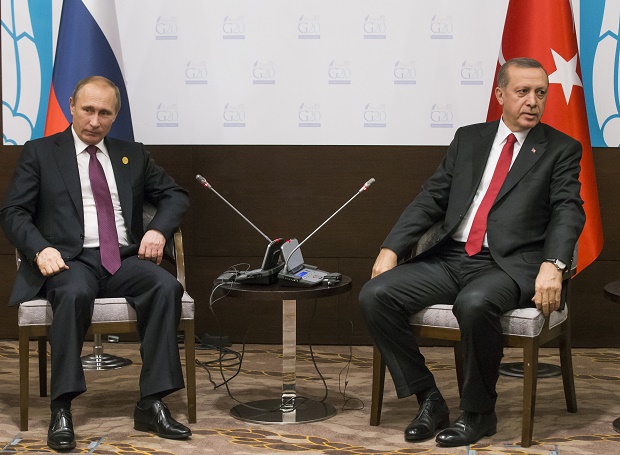
In this file photo taken on Monday, Nov. 16, 2015, Russian President Vladimir Putin, left, and Turkish President Recep Tayyip Erdogan pose for the media before their talks during the G-20 Summit in Antalya, Turkey. Putin ordered the deployment of long-range air defense missiles to a Russian military base in Syria and Russias military said it would destroy any target that may threaten its warplanes following the downing of a Russian military jet by Turkey. AP File Photo
MOSCOW, Russia—Russia on Thursday vowed to carry out broad retaliatory measures against Turkey’s economy to avenge the downing of one of its warplanes as Moscow and Ankara traded furious verbal volleys.
READ: Putin sends advanced anti-aircraft missiles to Syria vs Turkey
Turkish President Recep Tayyip Erdogan angrily rebuffed the Kremlin’s demands for an apology and said his Russian counterpart, Vladimir Putin, had snubbed a phone call from him after Tuesday’s incident.
The downing of the plane on the Syrian border has raised fears it could fuel a wider geopolitical conflict, and highlighted the difficulty of forging consensus on Syria as French President Francois Hollande held talks with Putin in Moscow.
READ: Turkish attack on Russian fighter plane ‘a stab in the back’ – Putin
Hollande is trying to cobble together a broad coalition, including Russia, to crush the Islamic State of Iraq and Syria (ISIS) group following the November 13 attacks in Paris.
While Russia has ruled out any military retaliation against NATO member Turkey, Prime Minister Dmitry Medvedev gave his ministers two days to work out “a system of response measures” in the economic and humanitarian spheres.
He said the punitive steps for what he termed “this act of aggression” could include halting joint economic projects, restricting financial and trade transactions and changing customs duties.
Measures could also target transport and tourism after Putin told citizens not to travel to Turkey, a hugely popular tourist destination for Russians.
The foreign ministry urged those already in Turkey to return home due to “existing terrorist threats.”
Russia also tightened control over Turkish food imports over alleged safety standard violations.
Economy Minister Alexei Ulyukayev did not rule out that the measures could hit two major projects with Turkey—the planned Turk Stream gas pipeline and the Akkuyu nuclear power plant—in a move that looks set to raise concerns in energy-poor Turkey.
Separately, Turkey on Thursday summoned the Russian ambassador to Ankara over an “unacceptable” violent demonstration over the plane shooting that took place outside the Turkish embassy in Moscow, the foreign ministry said.
‘Shame on you’
Ahead of the Hollande talks on the Syrian crisis, Putin and Erdogan traded barbs, with the Russian leader saying he was waiting for an apology and Erdogan ruling out any such move.
“We are under the impression that the Turkish leadership is deliberately pushing Russian-Turkish relations into deadlock. We regret that,” said Putin.
Putin dismissed Ankara’s claim that it did not know the plane was Russian.
“We considered Turkey a friendly state and simply did not expect any attacks from there. That is why we consider this hit treacherous,” he said.
He went on to accuse Turkey of failing to stop “industrial levels” of oil being transported there daily from Syria’s “terrorist-controlled territories.”
“These barrels are not only carrying oil but also the blood of our citizens, because with this money terrorists buy weapons and ammunition and then organise bloody attacks,” he added.
Erdogan said earlier on Thursday that Putin had refused to answer his call and insisted his country did not buy any oil from ISIS.
ISIS has claimed responsibility for the attacks in Paris that left 130 dead and 350 injured, and for the downing of a Russian jetliner over Egypt on October 31, killing all 224 on board.
“Shame on you. Those who claim we buy oil from Daesh are obliged to prove it. If not, you are a slanderer,” he said in a speech, using an alternative name for ISIS.
Analysts said that while both countries can ill-afford a permanent rupture in ties, the clash of egos between the two leaders could further damage relations.
“Their desire not to lose face has the potential to weaken otherwise pragmatic calculations to contain the crisis,” said Anthony Skinner, director of political risk at Verisk Maplecroft consultancy.
Moscow targets rebels
The shooting down of the aircraft is thought to be the first downing of a Russian plane by a NATO member since 1952 when US pilots brought down a Soviet plane near Vladivostok during the Korean War.
Tuesday’s incident led to the deaths of one of the two pilots and of a soldier who took part in a failed rescue operation—Moscow’s first combat losses since the start of its Syria campaign.
On Thursday, Moscow said its forces had wiped out Syrian rebel groups operating in the area where its jet was brought down, unleashing a huge bombardment after rescuing the second pilot.
Moscow also said it had now stationed its most hi-tech S-400 missile defense system at its airbase in Syria.
Turkey insists its forces repeatedly warned the Russian aircraft, an assertion backed up by the United States, which said however that it was not yet clear which side of the border the jet was on when it was targeted.
Moscow, an Assad ally, says the plane never entered Turkish airspace and Russian Foreign Minister Sergei Lavrov has branded the incident a “planned provocation.”